Is lutein a Magic Bullet for cognition?
-
Lutein across the Lifespan: From Childhood Cognitive Performance to the Aging Eye and Brain (2019)
Lutein is a non-provitamin A dietary carotenoid found in dark green leafy vegetables, corn, eggs, and avocados. Among the carotenoids, lutein and its isomer, zeaxanthin, are the only 2 that cross the blood–retina barrier to form macular pigment in the retina. Lutein also preferentially accumulates in the human brain across multiple life stages. A variety of scientific evidence supports a role for lutein in visual as well as cognitive function across the lifespan. The purpose of this review is to summarize the latest science on lutein's role in the eye and the brain across different ages.
By way of background, lutein it known for being needed for the eye to function properly. The body concentrates lutein in the eye and brain.
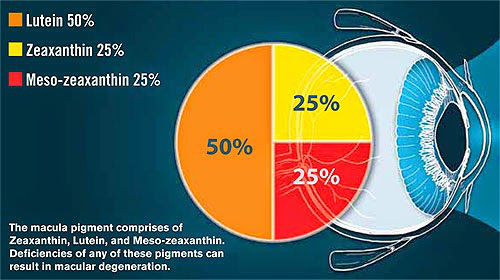
Lutein and zeaxanthin both highly absorb light having a wavelength of roughly 400 to 500 nm, which corresponds with the blue light portion of the visible spectrum.
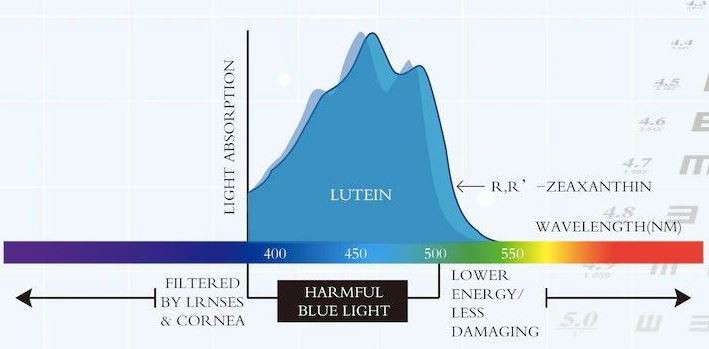
Abstract
A previous systematic review revealed that lutein intake leads to improved cognitive function among older adults. However, the association between lutein intake and brain health remains unclear. Methods: We searched the Web of Science, PubMed, PsycInfo, and Cochrane Library for research papers. The criteria were (1) an intervention study using oral lutein intake or a cross-sectional study that examined lutein levels and the brain, (2) participants were older adults, and (3) brain activities or structures were measured using a brain imaging technique (magnetic resonance imaging (MRI) or electroencephalography (EEG)). Results: Seven studies using MRI (brain activities during rest, cognitive tasks, and brain structure) and two studies using EEG were included. We mainly focused on MRI studies. Three intervention studies using MRI indicated that 10 mg lutein intake over 12 months had a positive impact on healthy older adults’ brain activities during learning, resting-state connectivity, and gray matter volumes. Four cross-sectional studies using MRI suggested that lutein was positively associated with brain structure and neural efficiency during cognitive tasks. Conclusion: Although only nine studies that used similar datasets were reviewed, this systematic review indicates that lutein has beneficial effects on healthy older adults’ brain health.
-
[Lutein and zeaxanthin: The possible contribution, mechanisms of action and implications of modern dietary intake for cognitive development in children.](file:///C:/Users/paten/Downloads/HRBLoskutvoaetal2019.pdf) (2019)
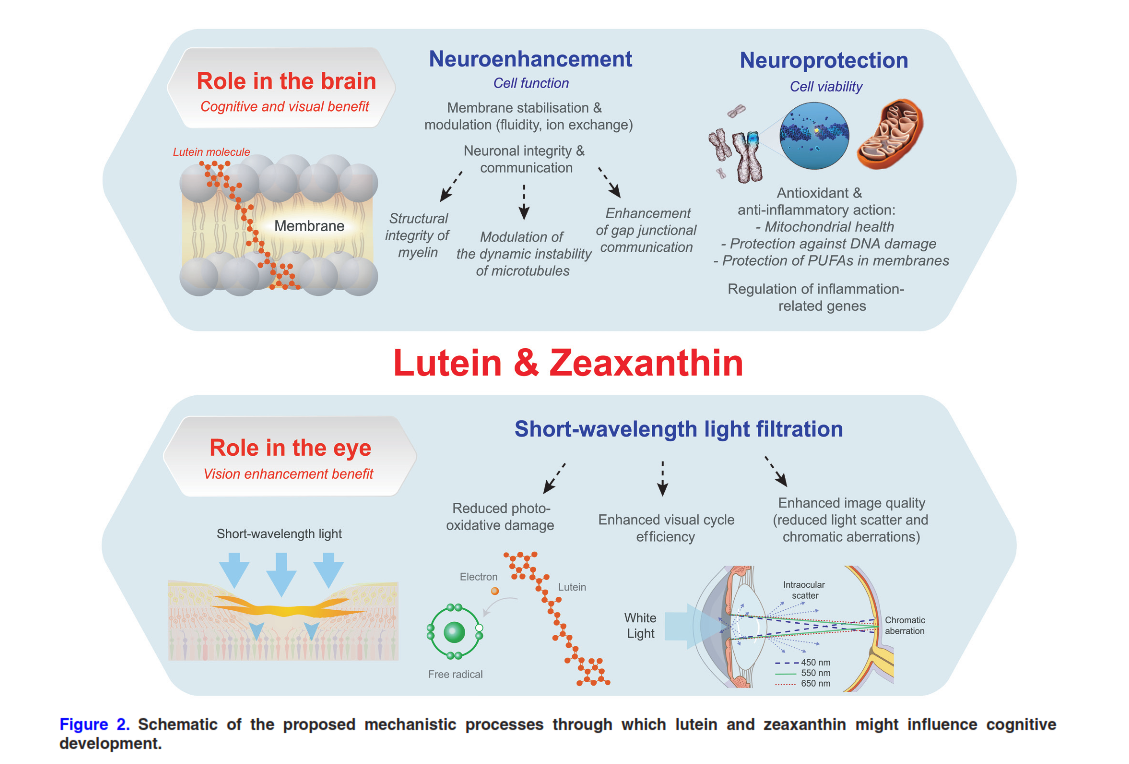
-
Lutein also preferentially accumulates in the human brain across multiple life stages.
Preferentially accumulating in the brain as you age doesn't sound very good.
I actually remember reading older people were less sensitive to blue light/screens to kids, so lutein having a role in blue light filtering makes sense to me. I just don't know how stable lutein is given the double bonds though.
-
@izkrov - I have been reading more on this topic and it appears eating foods that contain lutein is not only brain-safe but also brain/cognition protective into old age.
A possible role for lutein and zeaxanthin in cognitive function in the elderly (2012)
Epidemiologic studies suggest that dietary lutein and zeaxanthin may be of benefit in maintaining cognitive health. Among the carotenoids, lutein and zeaxanthin are the only two that cross the blood-retina barrier to form macular pigment (MP) in the eye. They also preferentially accumulate in the human brain. Lutein and zeaxanthin in macula from nonhuman primates were found to be significantly correlated with their concentrations in matched brain tissue. Therefore, MP can be used as a biomarker of lutein and zeaxanthin in primate brain tissue. This is of interest given that a significant correlation was found between MP density and global cognitive function in healthy older adults. An examination of a relation between cognition and lutein and zeaxanthin concentrations in the brain tissue of decedents from a population-based study in centenarians found that zeaxanthin concentrations in brain tissue were significantly related to antemortem measures of global cognitive function, memory retention, verbal fluency, and dementia severity after adjustment for age, sex, education, hypertension, and diabetes. In univariate analyses, lutein was related to recall and verbal fluency, but the strength of the associations was attenuated with adjustment for covariates. However, lutein concentrations in the brain were significantly lower in individuals with mild cognitive impairment than in those with normal cognitive function. Last, in a 4-mo, double-blinded, placebo-controlled trial in older women that involved lutein supplementation (12 mg/d), alone or in combination with DHA (800 mg/d), verbal fluency scores improved significantly in the DHA, lutein, and combined-treatment groups. Memory scores and rate of learning improved significantly in the combined-treatment group, who also showed a trend toward more efficient learning. When all of these observations are taken into consideration, the idea that lutein and zeaxanthin can influence cognitive function in older adults warrants further study.
Role of lutein and zeaxanthin in visual and cognitive function throughout the lifespan (2014)
Abstract
The relationship between lutein and zeaxanthin and visual and cognitive health throughout the lifespan is compelling. There is a variety of evidence to support a role for lutein and zeaxanthin in vision. Lutein's role in cognition has only recently been considered. Lutein and its isomer, zeaxanthin, are taken up selectively into eye tissue. Lutein is the predominant carotenoid in human brain tissue. Lutein and zeaxanthin in neural tissue may have biological effects that include antioxidation, anti-inflammation, and structural actions. In addition, lutein and zeaxanthin may be protective against eye disease because they absorb damaging blue light that enters the eye. In pediatric brains, the relative contribution of lutein to the total carotenoids is twice that found in adults, accounting for more than half the concentration of total carotenoids. The greater proportion of lutein in the pediatric brain suggests a need for lutein during neural development as well. In adults, higher lutein status is related to better cognitive performance, and lutein supplementation improves cognition. The evidence to date warrants further investigation into the role of lutein and zeaxanthin in visual and cognitive health throughout the lifespan.
Oxidative stress is involved in age-related cognitive decline. The dietary antioxidants, carotenoids, tocopherols, and vitamin A may play a role in the prevention or delay in cognitive decline. In this study, sera were obtained from 78 octogenarians and 220 centenarians from the Georgia Centenarian Study. Brain tissues were obtained from 47 centenarian decedents. Samples were analyzed for carotenoids, 𝛼-tocopherol, and retinol using HPLC. Analyte concentrations were compared with cognitive tests designed to evaluate global cognition, dementia, depression and cognitive domains (memory, processing speed, attention, and
executive functioning). Serum lutein, zeaxanthin, and 𝛽-carotene concentrations were most consistently related to better cognition (𝑃 < 0.05) in the whole population and in the centenarians. Only serum lutein was significantly related to better cognition in the octogenarians. In brain, lutein and 𝛽-carotene were related to cognition with lutein being consistently associated with a range of measures. There were fewer significant relationships for 𝛼-tocopherol and a negative relationship between brain retinol concentrations and delayed recognition. These findings suggest that the status of certain carotenoids in the old may reflect their cognitive function. The protective effect may not be related to an antioxidant effect given that 𝛼-tocopherol was less related to cognition than these carotenoids. -
I'd say +1 for broccoli but someone might call me a fake-peater.
Nice thread Mr David. Grandma wasn't lying.
-
If we summarize:
Lutein and zeaxanthin in the eye (6 mg).
Vitamin E and b-carotene for vessel membranes (2 x 4mg) Vit E inside, B-carotene outside. (1)
Mainly lutein and carotenoid for the brain (+ lycopene).
Lycopene for prostate.
Note: I won’t take any supplement for B-carotene: No need and could be problematic if you smoke.
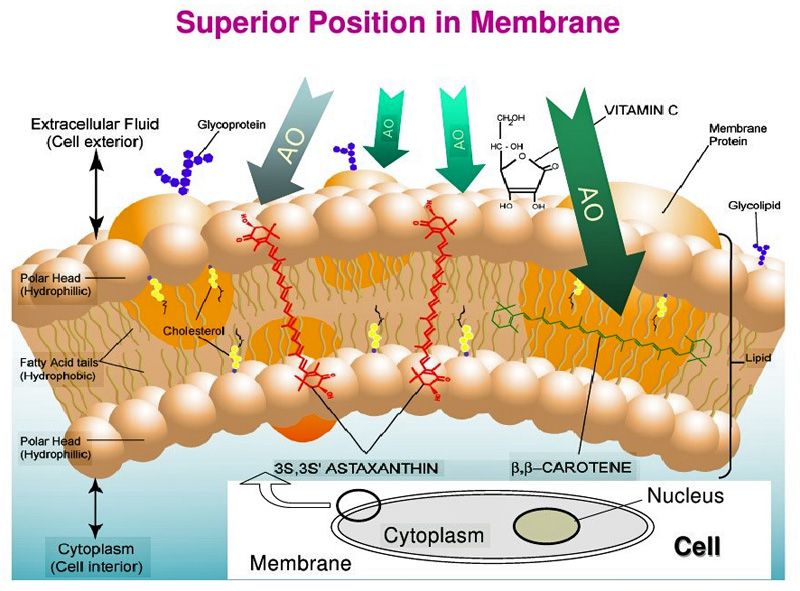
Useful info (in French, translator needed):- Vit E et peroxydation des membranes
http://mirzoune-ciboulette.forumactif.org/t642-vitamine-e-et-peroxydation-des-membranes#5645
Caution: - For vit E: at least 2 tocos. Too much of a good thing is bad.
- Polyphenols modify the microbiota. In cure, ok.
- Vit E et peroxydation des membranes
-
Eat lots of eggs daily
-
@bio3nergetic Raw or boiled?
-
@PrinceTrebata Egg yolks raw, whites very well cooked.
-
@PrinceTrebata said in Is lutein a Magic Bullet for cognition?:
@bio3nergetic Raw or boiled?
This question is relevant to vegetable sources of lutein as well.
Peatbot: Green leafy vegetables can be healthy, but there are some considerations to keep in mind. They are important sources of magnesium and vitamin K, and when cooked, they can provide a favorable balance of minerals such as magnesium, potassium, and calcium. Cooking is important because raw greens contain cellulose that encloses nutrients, making them inaccessible to our enzymes. Cooking breaks down the cellulose, making the nutrients more digestible.
However, raw leafy greens contain defensive chemicals that can block digestive enzymes, which can be problematic for some people. Cooking these vegetables thoroughly can help break down these toxins. Additionally, some leafy greens, like spinach, contain oxalic acid, which can interfere with calcium absorption.
Overall, while green leafy vegetables can be a healthy part of the diet, cooking them can enhance their nutritional benefits and reduce potential digestive issues.
-
@DavidPS said in Is lutein a Magic Bullet for cognition?:
Role of lutein and zeaxanthin in visual and cognitive function throughout the lifespan (2014)
While there is no recommended dietary intake for **lutein, intakes of approximately 6 mg/d have been associated with a decreased risk of age-related macular degeneration. The current intakes of lutein among adults fall well below this level, with average intakes of <2 mg/d for both men and women. Only men in the 99th percentile of lutein/zeaxanthin intake and women in the 95th percentile meet the dietary intakes that have been related to decreased risk of age-related macular degeneration. Therefore, there is a dietary gap between the intakes believed to be of benefit and the intakes being consumed. Increasing dietary lutein intake through healthy food choices could be an important public health strategy for reducing the risk of visual or cognitive impairment.
If a carnivore who wants to mono source all of their lutein from eggs, it looks like 30 eggs per day for the rest of their life would keep them in the zone (>6 mg/d).
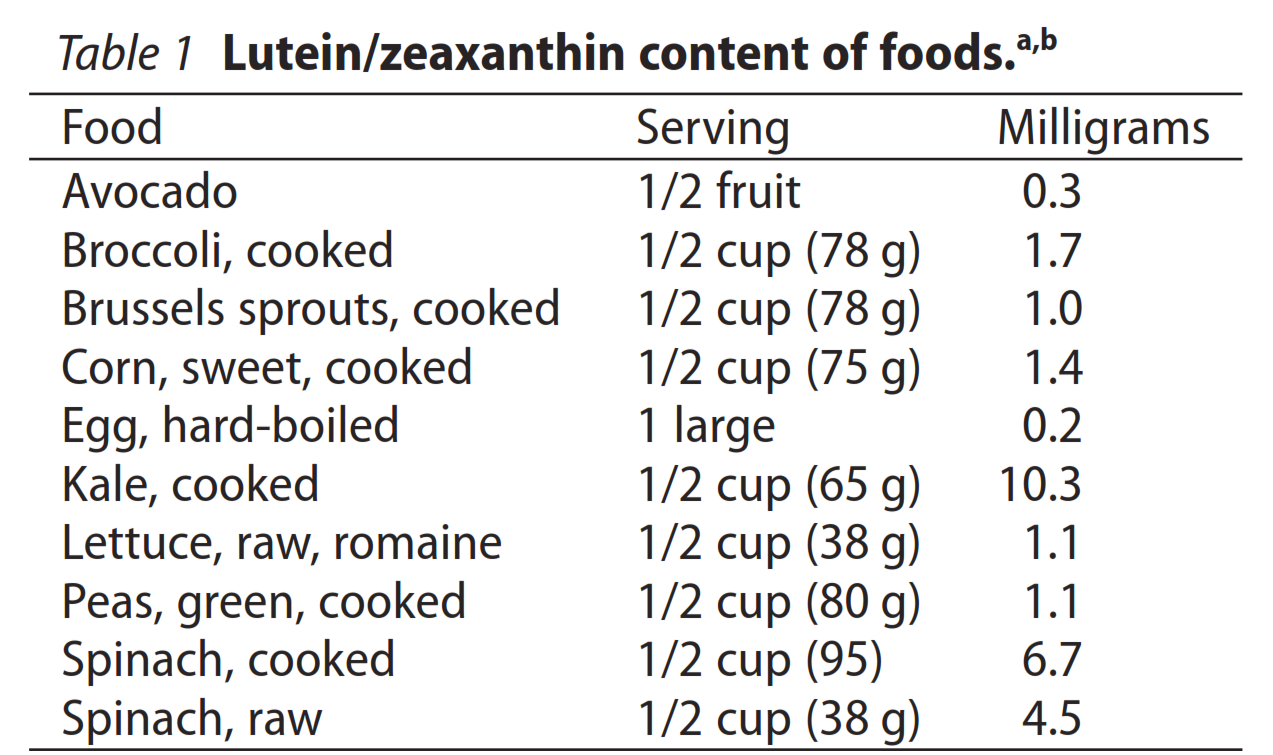
-
@DavidPS another W for eggs
-
@DavidPS That's for hard boiled though I'm pretty sure high temps decrease lutein
-
Typical loss of Lutein+Zeaxanthin (as compared to raw food): 5% Freeze, 50% Dry, 25% Cook, 35% Cook+Drain, 10% Reheat.
Source: Nutritional Effects of Food Processing
http://nutritiondata.self.com/topics/processing
Freezing, Drying, Cooking, and Reheating.
Note: the results are often variable. -
@LucH - thank you, this is very useful information.
-
@asterbolic - A 25-35% reduction in lutein will still require lot of raw eggs every day to meet the 6 mg/d level. Only men in the 99th percentile of lutein/zeaxanthin intake and women in the 95th percentile meet the dietary intakes that have been related to decreased risk of age-related macular degeneration and cognitive impairment.
There are several safety issues with eating raw eggs. Is Eating Raw Eggs Safe and Healthy?
Since raw eggs deplete biotin, see also
Is Biotin as Good as Advertised for Your Hair Loss? -
 D DavidPS referenced this topic on
D DavidPS referenced this topic on
-
A 2024 review article - Beyond food colouring: Lutein-food fortification to enhance health
-
 D DavidPS referenced this topic on
D DavidPS referenced this topic on
-
@LucH said in Is lutein a Magic Bullet for cognition?:
Typical loss of Lutein+Zeaxanthin (as compared to raw food): 5% Freeze, 50% Dry, 25% Cook, 35% Cook+Drain, 10% Reheat.
Source: Nutritional Effects of Food Processing
http://nutritiondata.self.com/topics/processing
Freezing, Drying, Cooking, and Reheating.
Note: the results are often variable.Thanks for the info, though this contradicts what @DavidPS posted above, where cooked spinach has more lutein than raw.
-
@Mossy said in Is lutein a Magic Bullet for cognition?:
Thanks for the info, though this contradicts what @DavidPS posted above, where cooked spinach has more lutein than raw.
I suppose it varies from different studies and what is found in the ground.
-
@LucH said in Is lutein a Magic Bullet for cognition?:
@Mossy said in Is lutein a Magic Bullet for cognition?:
Thanks for the info, though this contradicts what @DavidPS posted above, where cooked spinach has more lutein than raw.
I suppose it varies from different studies and what is found in the ground.
Yes. I'm also considering that the 1/2 cup is volume, where cooked spinach shrinks, hence the higher weight in grams to the right.